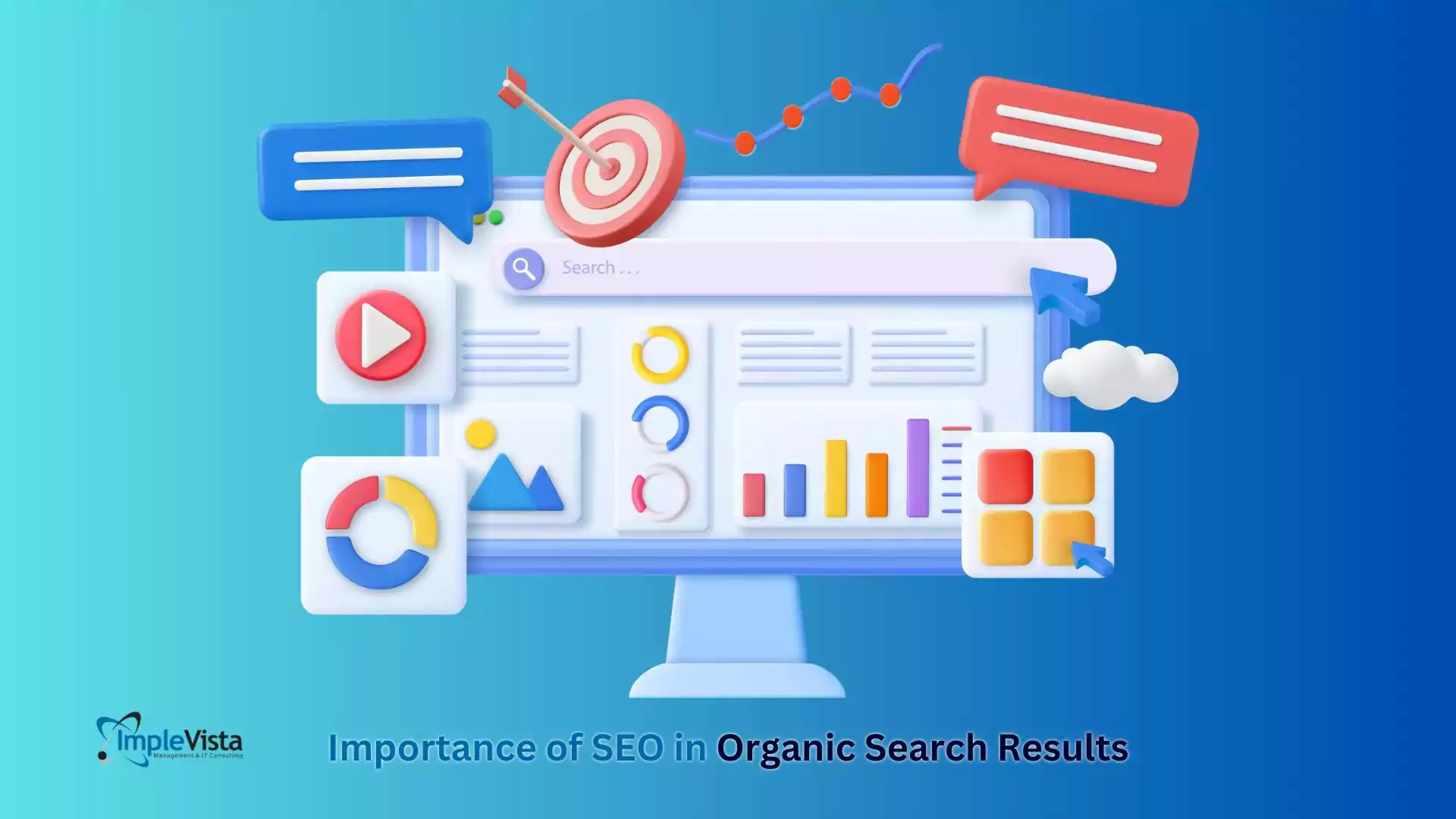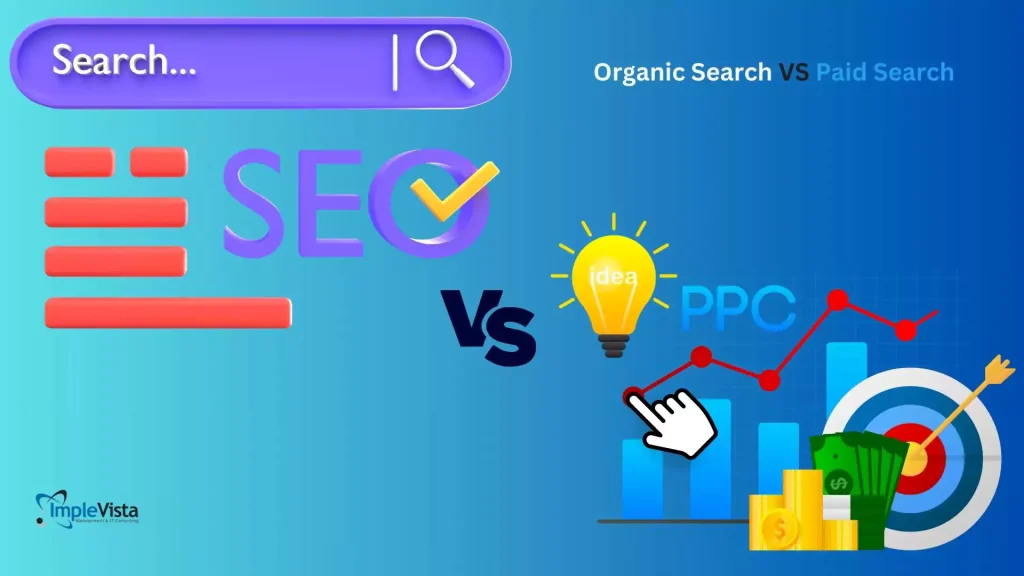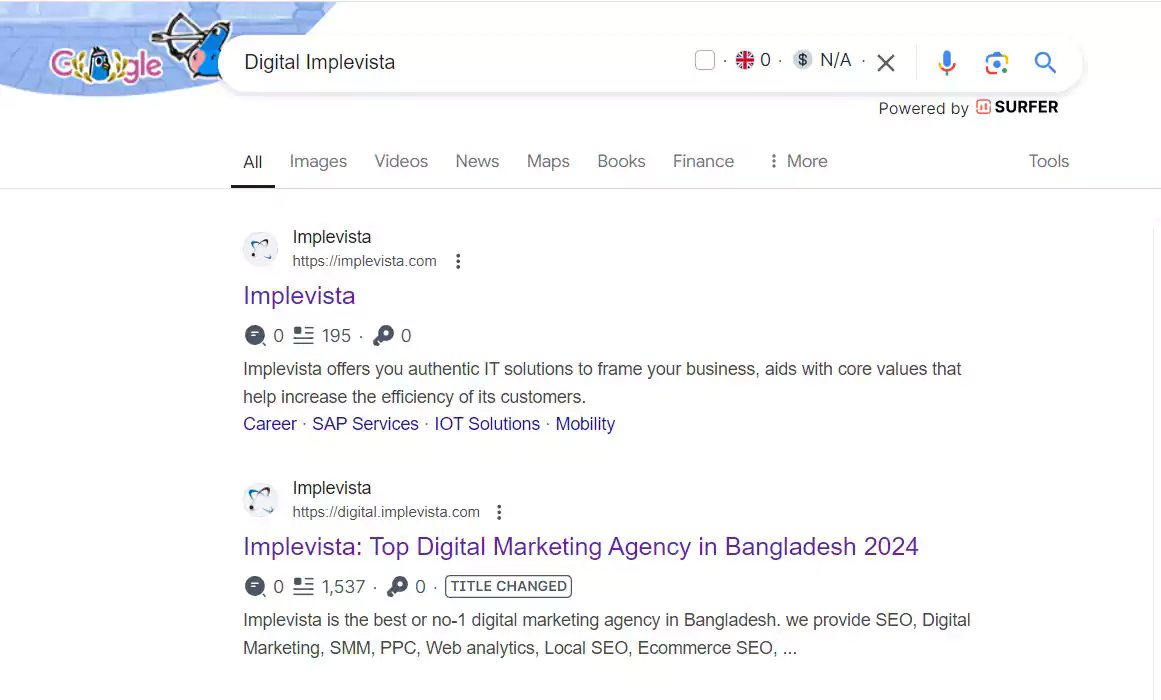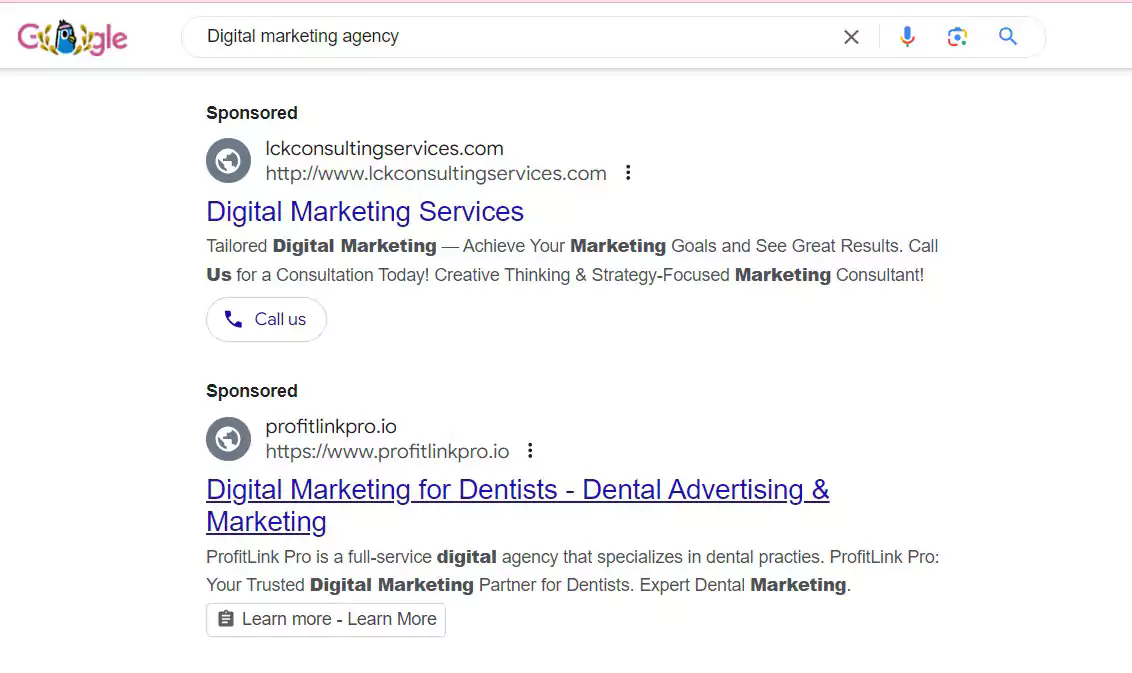How can potential clients find your website while researching products or services online? Organic Search VS Paid Search results are the solution. These findings are vital ways visitors interact with your website and company. Understanding and using these search results may boost your online exposure, brand recognition, and income.
We’ll explain Organic Search VS Paid Search, their benefits and downsides, and how to utilize both to establish a balanced and effective search engine strategy.

Definition of SEO
SEO optimizes your website’s content for search engines like Google. It aims to boost site traffic quantity and quality. Use keyword-rich content and arrange your website so search engines can read and evaluate it.
Organic search results depend on your content’s relevancy to the user’s search query, quantity of quality backlinks, and domain authority. So, ranking well in organic search results shows visitors that your material is reliable.
At Digital Implevista, we optimize for Google, the major search engine, knowing that doing well on Google will enhance your performance on Bing and Yahoo.
Understanding SEO
SEO optimizes web pages to rank better in search engine results for specified keywords and phrases. Keyword research, content optimization, technological improvements, and link-building are all part of SEO. Increase site traffic by making it easy for search engines like Google to interpret, index, and rank your material.
Key Components of SEO
- Keyword Research: Knowing what phrases your target audience uses to search for your business’s products, services, and information is the cornerstone of any SEO plan. Google Keyword Planner, Moz, and Semrush can help you find keywords with high search volume and competitiveness.
- Content Optimization: Once you know your keywords, write high-quality, keyword-optimized content. This requires natural keyword integration, leveraging keywords in headers, meta descriptions, and alt text, and creating informative, entertaining, and worthwhile content.
- Technical SEO: Technical SEO optimizes your website’s backend for search engines to crawl and index. It includes website performance, mobile friendliness, URL structure, and schema markup.
- Link Building: Your site’s authority and ranking potential depend on backlinks. Search engines value and trust material with high-quality backlinks from credible sites.
What Is Organic Search?
Organic search refers to search engine-generated traffic. Instead of paying for search results, organic search rankings are earned through SEO. Keyword relevance, backlinks, domain authority, and more decide these results.
Example of Organic Search Results
Say you want “best digital marketing strategies for startups.” These are organic search results without “Ad” labels. Your search query determined Google’s most relevant and valuable pages.
SEO Cheat Sheet: Strategies for Improving Organic Search Results
An effective SEO plan may seem complicated, but understanding the process is essential. Use this short tutorial to get started.
- Use Keywords Your Audience Is Searching For
Understand what keywords your target audience uses to locate businesses like yours to increase organic search rankings. We start with rigorous research.
First, research your niche and talk to customers. Ask them to describe your brand and what challenges or needs your product or service solves. Putting yourself in your consumers’ position helps you understand their internet search phrases.
- Crafting a Keyword List
Sort possible keywords into marketing funnel-aligned groups. How to proceed:
Break It Down: First, define your brand’s core category, then split it into topic buckets. In each category, put keywords you wish to rank for.
Refine Your List: Improve your keyword list with Moz or Semrush. You may find the most searched terms using these tools.
Incorporate Keywords into Content: Use your refined keyword list to optimize your website’s content and generate fresh material that organically includes keywords.
- Ensure Your Content Has Internal Links and Backlinks
SEO involves more than keywords. Your site’s rating depends on internal and external links.
How to Get Backlinks
Backlinks are external links to your site. They matter because search engines utilize them to evaluate your content. Ways to get backlinks:
Report Broken Links: Find broken links on other websites and replace them with yours.
Reach Out to Bloggers and Influencers: Reach out to specialized bloggers and influencers to promote your business.
Request Links from Partners: Ask companies you have relationships with to link to your site.
Convert Unlinked Mentions: Find business references without links and request they link to your site.
Write Guest Articles: Contribute guest posts to other websites and include links to your site.
Remember, Never assume all backlinks are equal. High-quality, relevant links are crucial. Google Search Console, Semrush, and Ahrefs may assist you in examining your backlink profile and targeting the correct sites.
Internal Linking for SEO
SEO also need internal connections or links within your website. They tell search engines how your site is structured and which pages matter.
Here are some best practices for internal linking:
Relevance: Make sure internal links are relevant and valuable.
Keyword-Rich Anchor Text: Use keyword-rich anchor language for internal links.
Regular Audits: Check your internal links using Google Search Console once or twice a year.
Update Old Pages: Add internal links to previous material to keep it relevant and rank higher.
Pros and Cons of Organic Search
Understanding organic search’s pros and cons will help you determine how much SEO to do.
Advantages of Organic Search
- Captures Higher ROI
Optimizing a website for organic search requires initial effort, but recurring expenditures are negligible once the website is ranked well. Because organic search is low-maintenance, it increases your ROI over time by attracting people without further spending.
- Improves Credibility
Organic rankings indicate search engines trust your material. First-page Google results are credible because they provide excellent material. Ranking high is crucial since Google’s top result gets 40% of clicks.
- Increases Brand Awareness
Organic search results boost brand awareness even if visitors don’t know you. Your brand becomes more well-known as people see it more often in search results.
Disadvantages of Organic Search
- Difficult to Achieve
Competition is intense in SEO. With millions of websites vying for keywords, first-page ranking is difficult. For high ranks, your material must match search intent—the user’s goal for searching.
- Less Initial Traffic
SEO results take time. Your website won’t be first overnight. Build search engine trust and authority with constant optimization, great content, and time.
- Volatility
Organic search ranks change owing to competition, algorithm upgrades, technological challenges, and user experience. To stay on top, you must be vigilant and adaptable.
What Is Paid Search?
Pay-per-click (PPC) advertising lets you buy search engine rankings. Most paid search ads are text ads with “Ad.” at the top or bottom of the search results page.
How Does Paid Search Work?
Businesses bid on keywords for paid search advertisements. Ad performance depends on keyword relevancy, landing page quality, and predicted click-through rate.
Components of Quality Score
- Landing Page Experience: Usability, mobile-friendliness, and load time of the page your ad connects to.
- Ad Relevance: Your ad fits the user’s search well.
- Expected CTR: Your ad’s clickability is based on previous data and competition.
Even beginners can set up and manage PPC ads with Google Ads.
Key factors influencing your ad’s rank include:
- Bid Amount: You’re willing to pay for each click.
- Ad Relevance: How relevant your ad is to the user’s search query.
- Landing Page Quality: The quality and relevance of the page your ad directs users to.
- Expected Click-Through Rate (CTR): Users may click on your ad based on past performance and other variables.
Pros and Cons of Paid Search
Paid search also comes with its own set of benefits and drawbacks.
Advantages of Paid Search
- Increases Visibility
With sponsored search, your adverts may show on the top page of search results immediately after the campaign is set up. This fast Visibility is beneficial for small firms starting online.
- Audience Customization
Location, language, time of day, and user interests can be used to target audiences using PPC. Customization guarantees your adverts reach the right people at the right time.
- Ranking Stability
With well-targeted and optimized adverts, you can maintain a consistent sponsored search position. If managed well, sponsored search rankings are more consistent than organic search.
Disadvantages of Paid Search
- Ongoing Expense
Continuous investment is needed for PPC. When your money is out, adverts stop. Unlike organic search, which requires little upkeep, this continual expense is enormous.
- Ongoing Management
Successful PPC campaigns require continual monitoring and adjustment. Make sure your adverts reach the correct people and manage your budget well.
- Requires Expertise: Setting up a PPC campaign is easy, but optimizing it for optimal performance takes a detailed grasp of the platform, keyword strategy, and audience targeting.
How to Integrate Organic Search VS Paid Search Strategies
Consider these tactics to maximize organic and paid search:
- Keyword Sharing: Develop your SEO strategy with PPC data. Include high-performing sponsored search terms in your organic content.
- Content Amplification: Promote naturally successful, high-quality content with sponsored search. This can increase website traffic and Visibility.
- A/B Testing: Run A/B tests on your ad copy and landing pages through paid search campaigns. Use the insights gained to improve your organic content and site experience.
- Remarketing: Use remarketing and organic search. Start with organic search and then target visitors with paid advertisements to boost conversions.
- Unified Reporting: Use one report to track organic and paid search efforts. This will help you determine how each channel affects your goals and where to spend your money for optimum impact.
Organic Search VS Paid Search: Which Is Better?
Your business goals, money, and timetable determine whether organic or sponsored search is preferable. A comparison may help you decide:
For Long-Term Growth: Organizations seeking long-term web presence should use organic search. It takes an SEO effort, but the long-term rewards, including higher Credibility and fewer expenses, are worth it.
For Immediate Results: Quick Visibility is achieved with paid search. It’s ideal for fast-paced promotions, product launches, and lead generation.
For a Balanced Strategy: Organic and paid search frequently work best together. Organic search fosters long-term success, while sponsored search drives quick traffic. They develop an effective search strategy to boost exposure and ROI.
Organic Search VS Paid Search SEO: How Digital Implevista Can Elevate Your Google Search Results
Small and large businesses need a solid online presence in today’s digital world. Search engines like Google are where people go for products, services, and information, so firms must rank high. As experts in paid and organic SEO, Digital Implevista helps Bangladeshi and international businesses develop and appear on Google. This article discusses paid and organic SEO and how our customized approach may help your company succeed in both.
Understanding Organic SEO
Organic SEO improves a website’s rating in Google’s unpaid search results. This entails optimizing your website’s content, structure, and user experience for search engines. Organic SEO’s main components:
Keyword Research: Find and target your business’s most relevant keywords.
On-Page Optimization: Optimizing website content and meta tags for search engines.
Technical SEO: Maintaining your website’s architecture, performance, and mobile-friendliness.
Content Marketing: Developing high-quality, engaging material for your intended audience.
Link Building: Getting high-quality backlinks from respected websites helps increase your site’s Credibility.
Organic SEO is a long-term investment that cements your online presence. Despite slow effects, the advantages are long-lasting and cost-effective.
Exploring Paid SEO (PPC)
Pay-per-click (PPC) advertising, often paid SEO, includes buying top-of-SERP ads. PPC campaigns are most popular on Google Ads. Critical elements of sponsored SEO are:
Keyword Bidding: Bidding on appropriate business keywords for ad placement.
Ad Creation: Writing attention-grabbing ads that convert.
Campaign Management: Monitoring and optimizing PPC campaigns for optimum ROI.
Landing Page Optimization: Optimizing conversion-optimized landing pages following ad clicks.
Payment SEO is ideal for firms wanting instant Visibility since it yields faster results than organic SEO. However, it requires constant investment to be at the top of search results.
How Digital Implevista Can Help
At Digital Implevista, we understand that a successful SEO strategy often requires a blend of paid and organic approaches. Here’s how we can help your business:
- Customized Strategy Development: We customize an SEO plan that blends organic and paid tactics based on your business goals, industry, and competition.
- Comprehensive Keyword Research: Our team does extensive keyword research to find the best terms for your organic and paid campaigns, maximizing exposure and reach.
- Seamless Integration: We coordinate your organic and paid SEO to maximize traffic and conversions while maximizing your marketing budget.
- Ongoing Optimization: Implementation continues our effort. We monitor and tweak your campaigns based on statistics to increase success and growth.
- Performance Reporting: Transparent reporting lets you see how your campaigns are doing and your ROI.
FAQs with answers related to Organic Search VS Paid Search:
1. What is the difference between Organic Search VS Paid Search SEO?
Answer: Organic search is when websites rank naturally on SERPs based on their relevancy to a user’s query. SEO is used to get this rating without paying the search engine. However, the paid search includes businesses that are buying SERP advertising. They display the results at the top or bottom as “Ads.”
2. How long do organic SEO results take?
Answer: An organic SEO approach might take months to show results. As your website obtains authority, the benefits linger.
3. Which is better for my business: organic or paid SEO?
Answer: Business goals determine the optimal method. If you need rapid Visibility and results, try paid SEO. For long-term growth and cost-effectiveness, use organic SEO. Combining both is frequently best.
4. Which is better: organic search or paid search?
Answer: Combining organic and paid search yields the greatest results. Organic search yields slow results, yet it is cost-effective and creates confidence and trust. Paid search provides quick Visibility and audience control but demands continuing commitment. Your business goals, budget, and timetable determine the option.
5. How long do organic search results take?
Answer: Depending on keyword competitiveness, SEO approach, and website status, organic search results might take months. Ranking and traffic gains usually take 3–6 months.
6. How much does a paid search cost?
Answer: Your industry, budget, and keyword competition affect paid search costs. After someone clicks on your ad, you pay per click (PPC) in paid search. Depending on terms and competitiveness clicks cost a few cents to several dollars.
7. Once I top the search results, can I cease SEO?
Answer: No, SEO is continuous. You must optimize content, generate backlinks, and manage technical SEO even at the top of search results. Search engines update often, and competitors are continuously trying to outrank you. SEO keeps your website ranking and attracting organic visitors.
8. What are the primary organic search ranking factors?
Answer: Content relevance and quality, keyword use, domain authority, backlinks from credible sites, website speed, mobile-friendliness, user experience, and more affect organic search rankings. Google ranks webpages using complicated algorithms that consider these variables.
9. What can I do to boost my sponsored search Quality Score?
Answer: Create relevant, user-intent-aligned advertising to boost your sponsored search Quality Score. Make your landing page user-friendly, mobile-friendly, and fast. Include keywords in ads and landing sites. Evaluate and optimize ad campaigns using performance data.
10. Can organic ranking be achieved without paid search?
Answer: Yes, organic ranking is feasible without paid search. It takes a solid SEO strategy, good content, and persistence. While sponsored search can boost exposure, organic search results depend on relevance, authority, content and website quality.
11. What are the risks of relying solely on paid search?
Answer: Sponsored search is dangerous due to its constant cost. Your exposure will reduce immediately if your budget runs out and your adverts cease displaying. Competition raises paid search costs over time. With organic search, your long-term plan may be able to generate visitors and leads.
12. What is the best way to combine Organic Search VS Paid Search?
Answer: Use sponsored search to increase quick traffic and test which phrases convert best to blend Organic Search VS Paid Search. Create high-quality, SEO-optimized content to boost your organic search visibility. As organic results rise, you may focus your sponsored search approach on other keywords or audiences to maximize reach and ROI.
Digital Implevista helps businesses succeed online. Our staff will help you develop a successful PPC campaign or improve organic results. Get in touch to understand how we can improve your Google rankings.






